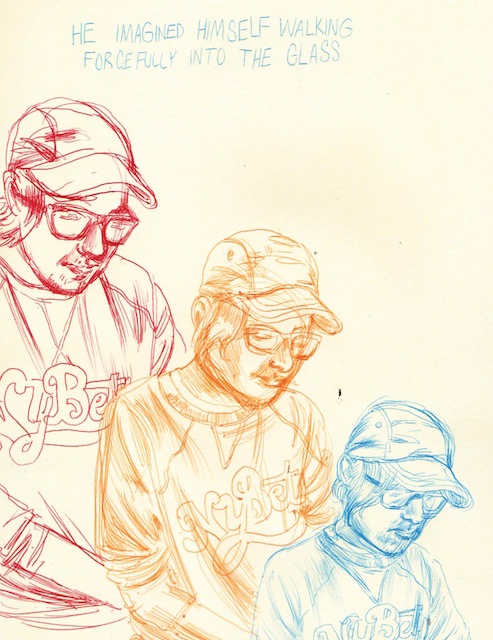Illustration by Nick Gazin

Illustration by Nick GazinRyan looked through glass at tomato sauce on spaghetti on a plate with three to five chicken wings or legs that seemed to be barbecued also on it and thought, “What is that?” and “Ryan thought, ‘What is that?’ while looking at spaghetti and chicken wings.” He walked to the end of the block, turned around, passed an extremely tall Asian man, entered an Old Navy, walked aimlessly toward the back of the store. An employee seemed to be running toward Ryan, who slowed a little, then turned so that he was moving in the same direction as the employee, who maneuvered past Ryan, who sat on a bench next to an elderly Hispanic woman. Ryan looked at his email on his iPhone. Cassie, his girlfriend, had emailed the story he wanted to reread. Cassie’s romantic interest in the story was named Bryant, the same name Ryan used for the character of himself in his recent, autobiographical fiction. Ryan remembered a few nights ago when Cassie asked why he used the name Bryant in his stories. He had felt a little confused why she asked that. He sometimes looked at what time it was while reading her story. He sensed the story was ending soon, then remembered that there were entirely different parts—that it spanned a much longer time than he’d been sensing—and felt pleasure from anticipating reading the later parts.
ΔΙΑΦΗΜΙΣΗ
ΔΙΑΦΗΜΙΣΗ
ΔΙΑΦΗΜΙΣΗ
ΔΙΑΦΗΜΙΣΗ
You have to learn to find it within you.
If you can learn to love it,
You just might like it.It also had something about saving one’s generation by “sleeping in.” Bryant tried and failed to remember the album’s second song. He thought about the song on that album that was around two minutes and had lyrics about life being like an oyster. He thought about eating something called “green mussels” with his parents in Florida at a sushi restaurant. He couldn’t remember the restaurant’s name. After thinking “Sushi House” and “Sushi Home” and “Sushi Zone,” he felt further from being able to remember the actual name than when he first tried to remember Cassie asleep, ten or 20 seconds ago.
ΔΙΑΦΗΜΙΣΗ
ΔΙΑΦΗΜΙΣΗ
